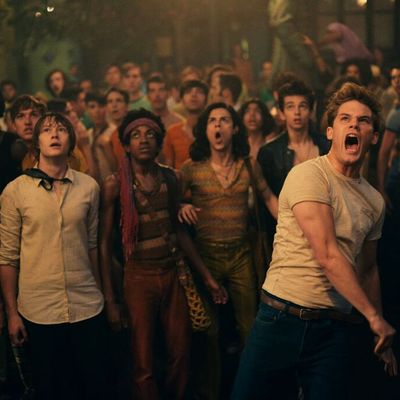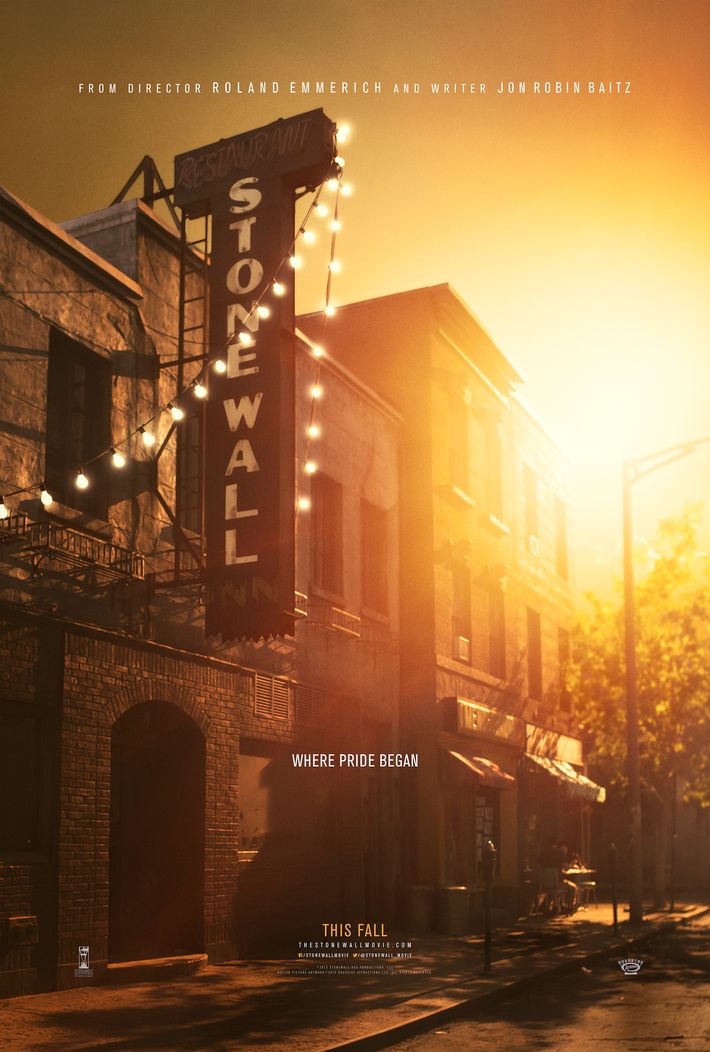
As the action-movie auteur behind films like Independence Day, The Day After Tomorrow, and White House Down, Roland Emmerich tends to spend his days on set managing explosions and working with tricky special effects. But when Emmerich recently changed gears to make the intimate, low-budget gay-rights drama Stonewall, he found himself faced with a whole new set of problems. “It was a huge challenge to make this movie, and if I had not absolutely wanted it, it would not have happened,” he told Vulture this week.
Emmerich’s new film tells the story of the 1969 Stonewall riots — where a long-oppressed queer community finally fought back against a police raid at New York’s Stonewall Inn — and when it comes out in theaters on September 25 (you can check out the exclusive poster teasing that release date below), it will do so at a pivotal point for gay rights and visibility. On the one hand, this has been a historic year for progress thanks to last month’s gay-marriage decision at the Supreme Court, and queer representation is at an all-time high both in real life and in the arts. At the same time, though, we’re coming up on the tenth anniversary of Brokeback Mountain, and it’s still as difficult as ever to get a gay movie financed, let alone a period piece dealing with a pivotal incident that isn’t taught in most high-school history books.

“It was an uphill battle, but we finally did it,” said Emmerich, who was only able to get Stonewall made after he moved production from New York to Montreal — “We wanted to do it in New York on location, and that failed miserably because it was so expensive” — and slashed the budget to a meager fraction of what he typically can command on his bigger films.
The ensemble nature of Stonewall also proved to be a hurdle for Emmerich. “If you can cast a central character with one or two famous actors, you have a good chance to get the movie financed, but in my case, I knew there was not really one central character in the Stonewall riots,” said the director. And while the film has a nominal point-of-view character in Danny (Jeremy Irvine), a young gay man kicked out of his family home who finds refuge with the street kids who congregate at the Stonewall Inn — all of whom face ongoing harassment that finally comes to a head during the riots — Emmerich insists that the diverse crowd that fought back at Stonewall won’t simply be reduced to just one young, blond hunk. “I think we represented it very well,” he said. “We have drag queens, lesbians, we have everything in the film because we wanted to portray a broader image of what ‘gay’ means.”
In fact, Emmerich cast several performers who’d never made a movie before — including Jonny Beauchamp, who’s since appeared on Penny Dreadful as Angelique — in an effort to diversify his cast, which also includes veteran actors like Ron Perlman and Jonathan Rhys-Meyers. But while Emmerich confirms that several of his newcomers are openly gay (like the director himself), he didn’t consider that a requirement to be cast. “I don’t think you should say, ‘He can only play gay because he is gay,’” said Emmerich. “I think Jeremy did an amazing job playing gay, acting gay, and then there were gay actors who also did an amazing job. It was more about who was the best actor for the part, and I always do it like that.”
Now, though, those intimate considerations are mostly put behind him, as Emmerich is in the middle of a grueling shoot for another one of his big action movies, the sequel to Independence Day. I asked him whether a movie like Stonewall provided an opportunity to recharge in between orchestrating bouts of big-budget carnage. “Totally,” he said. “Even talking about it to you now, I’m getting homesick. Right now I’m shooting a big one, and I have to do it in record time.” He laughed ruefully. “It’s an ongoing nightmare.”

